PCIe 4 NVMe SSD Comparison – WD Black SN850X vs Sabrent Rocket 4 Plus
If you have been out of the loop in the world of SSDs in the last couple of years, you may have missed the tremendously improvements in performance and storage that have occurred since 2020. Every since the commercial availability of PCIe 4.0 m.2 NVMe SSD arrived, we have since a continuous cycle of drives arriving from the big players in the world of storage, with barriers and records being broken every couple of months! Whether you are a desktop PC user, a laptop/Macbook owner or a PS5 gamer, if you have been looking at upgrading your storage to the current generation of drives, then chances are you have come across these two fantastically fast SSDs – The Spring 2021 generation Sabrent Rocket 4 Plus and the Summer 2020 released WD Black SN850X – two drives that, although released a little over a year apart, present tremendous strengths in different areas of the SSD market. The Sabrent and WD Black PCIe4 SSDs have very rarely left my ‘top 5 recommended SSDs’, but which one is best for you? Although both are 2280 length SSDs, after that, the architecture inside each is remarkably different. You see, Sabrent though itself not a NAND manufacturer, utilizes long-running partnerships with 3rd Party companies such as Phison, Micron and SK-Hynix, whereas WD develops their SSDs using in-house teams and acquired companies that are part of the Western Digital family, such as Sandisk and HGST. This means that although both brands are targeting the same areas of the solid-state storage industry, their results arrive with very different build styles that ends up prioritizing very different user needs. Today I want to compare two of the fastest PCIe4 M.2 NVMe SSDs that either company has ever commercially released (to date). Here is how the two drives compare in base line architecture:
I want to look at these two SSDs and compare them on Price, Value, Architecture, Performance and Durability, in order to help you decide which of these two SSDs is best for your PC or PS5 Storage needs. Let’s begin.
WD Black SN850X vs Sabrent Rocket 4 Plus – Price & Capacity
Now, the prices below for the Sabrent Rocket 4 Plus and WD Black SN850X SSD are from Amazon.com / Amazon.co.uk as of August 9th 2022 and do not take into account any promotions/deals. It is worth highlighting that due to a huge range of reasons (hardware shortages locally, cost of living rises affecting buy patterns, post-pandemic supply chain issues and a pain in the bum that was Chia crypto currency in 2021) the price and availability of SSDs have been particularly unstable. Still, even if we JUST look at this snapshot of the pricing of these drives, spread across the available capacities, we can definitely see that the prices for the WD Black SN850X are unusually mixed across the different currencies. Now, the Sabrent Rocket 4 Plus has been in the market much longer now and has had time to spread itself out and have a more balanced pricing structure (much as the original SN850 did a couple of years ago).
| Brand/Series | Sabrent Rocket Plus
|
WD Black SN850X
|
| 500GB Model | N/A | N/A |
| Price in $ and $ | N/A | N/A |
| 1TB Model | SB-RKT4P-1TB | WDS100T2X0E |
| Price in $ and $ | $179 / £180 | $159 / £159** |
| 2TB Model | SB-RKT4P-2TB | WDS200T2X0E |
| Price in $ and $ | $289 / £319 | $289 / £309** |
| 4TB Model | SB-RKT4P-4TB | WDS400T2X0E |
| Price in $ and $ | $699 / £599 | $699 / £749** |
| 8TB Model | SB-RKT4P-8TB | N/A |
| Price in $ and $ | $1499 / £1399 | N/A |
Now, the more recently released WD Black SN850X SSD was released by the brand almost 2 years after the original SN850 drive (one of the first, if not THE first 7,000MB/s commercial SSDs in the market). This was because in the intervening 12-24 months since the original’s release, many other SSD brands and manufacturers had continued to develop on the PCIe4 SSD space and release faster and more enduring drives (the price of arriving first I guess). No, of all the SSD brands that arrived on the scene, the ne that has seems to really make the biggest splash in the consumer SSD space is Sabrent. A brand that had been largely associated with HDD/SSD peripherals, adapters and post-production kit, Sabrent released the THEN fastest PCIe 4 SSD in the market (April 2021), as well as arriving at a price point a pinch lower than most other brands ANY arriving with an on-board heatshield and higher durability rating than others in the market. Now, fast forward to now and even though the WD Black SN850X is lower in price by a pinch, the Sabrent Rocket 4 Plus still arrives at quite a close price (whilst also arriving in a new 8TB 2280 form – another industry first at the PCIe4 m.2 level) and recently upgrading the whole range from 96L 3D TLC NAND to an impressive 176L and with that, slightly higher durability. Therefore, when it comes to the price and value, I think we have to call this a bit of a tie.
WD Black SN850X SSD = Best Price
Sabrent Rocket 4 Plus = Best Value
*TBC at the time of writing and will be addressed/confirmed later. The video below will break down the definitions and meaning of the terms used throughout this review and the comparison tables
** Pricing for the SN850X is quite varied online at launch and regardless of tax and currency exchange rates, the pricing here (taken from the official WD store) seems a bit uneven. This will hopefully even out soon.
WD Black SN850X vs Sabrent Rocket 4 Plus – Reported Read & Write Speed
Next, we should discuss the traditional sequential performance of the Sabrent Rocket 4 Plus and WD Black SN850X SSD, as this is by far the most common way drives have been compared (despite the rise in importance of IOPS and durability when it comes to SSDs, in the eyes of many the ‘MB/s’ and ‘GB/s’ figure will always reign supreme). As both of these drives are part of the m.2 PCIe 4 x4 NVMe generation of SSDs, that means that each drive has 8,000MB/s of PCIe bandwidth to attempt to saturate and, frankly, they do an incredible job of it! Now, it is important to keep things relative when you see performance stats, as the capacity of the drive plays a HUGE part in hitting higher speeds. The reason for this is because the actual storage on an SSD is the NAND, one or more modules on the PCB that scale in density and frequency depending on the scale of the drive total capacity. So, for example, a 1TB SSD will either be a single block of NAND at 1024GB or two blocks of NAND at 512GB. Two blocks mean that the drive can be read/written to twice as much and tends to increase performance in most cases. This same logic extends to higher capacities (e.g. 2TB = 1x 1TB or 4x 512GB) and depending on the quality of the NAND (e.g MLC vs TLC, or 96L vs 176L) and factors such as power use and heat, different SSD brands tend to pick their physical architecture differently. This is very much the case when it comes to the Sabrent Rocket 4 Plus and WD Black SN850X SSD, meaning that the scaling performance of each drive model as you jump between each capacity tier is quite pronounced. Note that sequential performance refers to big ‘blocks/blobs’ of data when data, is not hugely spread across the drive in small chunks (that is more accurately measurable in IOPS, which we will touch on in a bit). Another key point to remember is that these reported speeds are supplied by the brands themselves, in test scenarios running high high-end CPU+GPU combos (eg, 12-16 Core Xeon/Ryzen and 64GB Memory) that they represent to maximum performance possible, but domestic and mid-range commercial users are going to hit max performance thresholds a good 10-15% lower. Use the links at the top of the article to see the full testing and benchmarks of the WD Black SN850X and Sabrent Rocket 4 Plus in my 11th gen i5 + 16GB RAM setup.
| Brand/Series | Sabrent Rocket Plus
|
WD Black SN850X
|
| 500GB Model | N/A | N/A |
| Sequential Read (Max, MB/s), 128 KB | N/A | N/A |
| Sequential Write (Max, MB/s), 128 KB | N/A | N/A |
| 1TB Model | SB-RKT4P-1TB | WDS100T2X0E |
| Sequential Read (Max, MB/s), 128 KB | 7000MB | 7300MB |
| Sequential Write (Max, MB/s), 128 KB | 5500MB | 6300MB |
| 2TB Model | SB-RKT4P-2TB | WDS200T2X0E |
| Sequential Read (Max, MB/s), 128 KB | 7100MB | 7300MB |
| Sequential Write (Max, MB/s), 128 KB | 6850MB | 6600MB |
| 4TB Model | SB-RKT4P-4TB | WDS400T2X0E |
| Sequential Read (Max, MB/s), 128 KB | 7100MB | 7300MB |
| Sequential Write (Max, MB/s), 128 KB | 6850MB | 6600MB |
| 8TB Model | SB-RKT4P-8TB | N/A |
| Sequential Read (Max, MB/s), 128 KB | 7000MB | N/A |
| Sequential Write (Max, MB/s), 128 KB | 6000MB | N/A |
Now, the Sabrent Rocket 4 Plus having it’s NAND quality improved upon at the start of 2022 certainly resulted in an improvement in the drive’s performance in a few areas and it certainly beats the WD Black SN850X SSD in Write performance on the bulk of the capacities by a small margin. The WD Black SN850X on the other hand makes it’s own improvements over the Sabrent Rocket 4 Plus when it comes to Read performance, showing increases on every capacity tier in Sequential Read. Once again, this means that I have to call something of a tie between the WD Black SN850X and the Sabrent Rocket 4 Plus, as they both show of their own strengths in key areas.
WD Black SN850X and Sabrent Rocket 4 Plus = A TIE
WD Black SN850X vs Sabrent Rocket 4 Plus – Reported IOPS
Now, unlike the traditional performance benchmarks of transfer speeds in sequential Read/Write, IOPS has a much more important place in modern SSD use – especially as we start to see the capabilities of CPU, Memory and GPUs to harness the bandwidth of PCIe NVMe (such as Microsoft Direct Storage and modern gen consoles). Because modern high-scale computer processes (databases, loading game sandboxes and AI engines) use incremental loading and in-world loading on the fly, the abilities of an SSD to load vast numbers of smaller assets into the memory (either directly towards the GPU or unpacked by the CPU first) is incredibly important. The IOPS figure presented by SSD manufacturers is presented as a 4K random IOPS operation in Read and Write (4K being an incredibly small packet size and random, meaning constantly accessing data locations across the NAND). Both the Sabrent Rocket 4 Plus and the WD Black SN850X SSD score very, very high in IOPS (once again, based on high-end PC hardware and benchmarks by the brand themselves) and either one will do a fantastic job of loading/recording vast scales of low-volume/high-frequency data – but which one does it better?
| Brand/Series | Sabrent Rocket Plus
|
WD Black SN850X
|
| 500GB Model | N/A | N/A |
| Random Read (Max, IOPS), 4 KB QD32 | N/A | N/A |
| Random Write (Max, IOPS), 4 KB QD32 | N/A | N/A |
| 1TB Model | SB-RKT4P-1TB | WDS100T2X0E |
| Random Read (Max, IOPS), 4 KB QD32 | 350000 | 800,000 |
| Random Write (Max, IOPS), 4 KB QD32 | 700000 | 1,100,000 |
| 2TB Model | SB-RKT4P-2TB | WDS200T2X0E |
| Random Read (Max, IOPS), 4 KB QD32 | 650000 | 1,200,000 |
| Random Write (Max, IOPS), 4 KB QD32 | 700000 | 1,100,000 |
| 4TB Model | SB-RKT4P-4TB | WDS400T2X0E |
| Random Read (Max, IOPS), 4 KB QD32 | 650000 | 1,200,000 |
| Random Write (Max, IOPS), 4 KB QD32 | 700000 | 1,100,000 |
| 8TB Model | SB-RKT4P-8TB | N/A |
| Random Read (Max, IOPS), 4 KB QD32 | 700000 | N/A |
| Random Write (Max, IOPS), 4 KB QD32 | 1,000,000 | N/A |
Now, THIS is where the WD Black SN850X takes a very clear and decisive lead over the Sabrent Rocket 4 Plus. Western Digital has always made significant strides in their SSDs to prioritize random IOPS performance. This makes alot of sense, now that we are reaching the point where your PC/Console device does not have a storage bottleneck (unlike SATA all these years) and at this point, the sheer speed that an SSD can push tremendously high frequency but low volume data packets (such as game world data, databases and metadata) is quite a big factor in choosing the correct SSD for your needs. The Sabrent Rocket 4 Plus DOES provide some high IOPS numbers and these grow right to the 1 million mark at the 8TB level, but the WD Black SN850X manages to cross this even in the smaller capacities and peaks at 1.1 Million read IOPS and 1.2 Million Write IOPS – A high point across practically the whole PCIe4 NVMe SSD Tier! A clear win for WD here.
WD Black SN850X SSD = Highest IOPS Rating
WD Black SN850X vs Sabrent Rocket 4 Plus – NASCompares Tests
Now, up to this point, we have been looking at the reported maximum performance of the WD Black SN850X and Sabrent Rocket 4 Plus that was benchmarked by the respective brands. Although these are tremendously useful figures in isolating the max read/write for them both, the systems that they are tested with do not really represent the average user. So, in my reviews and benchmark video/article for each SSD, I use a Windows 10 Pro machine, running on an Intel Core i5 6-Core 11th Gen Processor, 16GB of DDR4 2666Mhz Memory and the M.2 NVMe SSD for the review being accessed as an additional drive (not OS, but still on a PCIe Gen 4×4 m.2 bandwidth slot). These are some of the results of that testing in traditional performance and IOPS:
| Sabrent Rocket 4 Plus ATTO 4GB Test R/W | WD Black SN850X ATTO 4GB Test R/W |
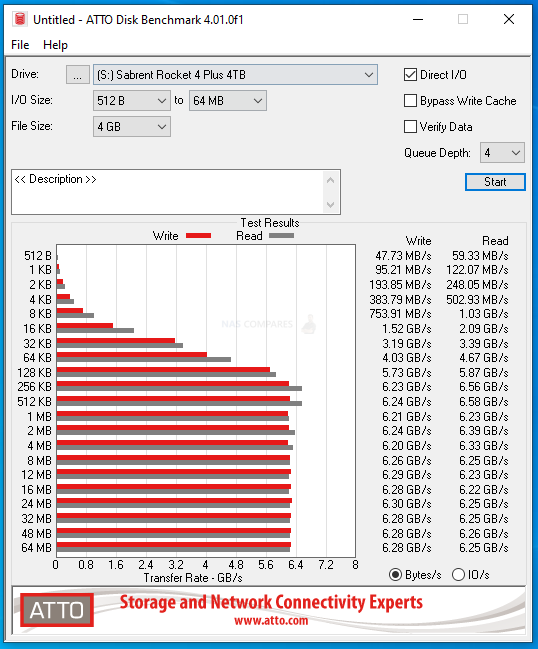 |
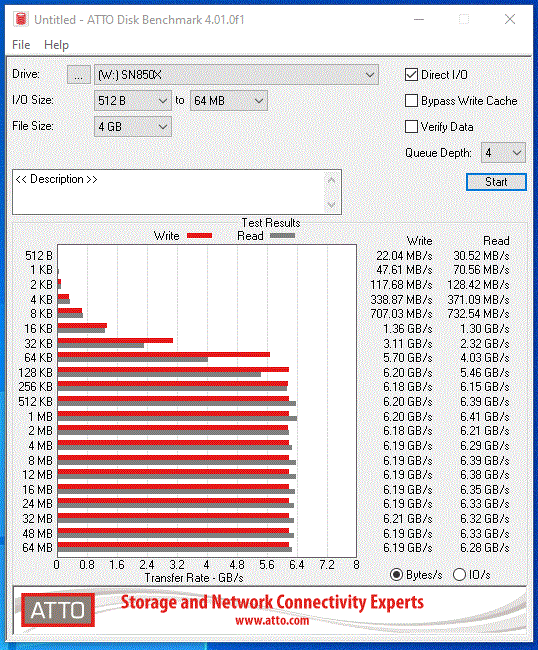 |
| Sabrent Rocket 4 Plus Crystal Disk 4GB Test R/W | WD Black SN850X Crystal Disk 4GB Test R/W |
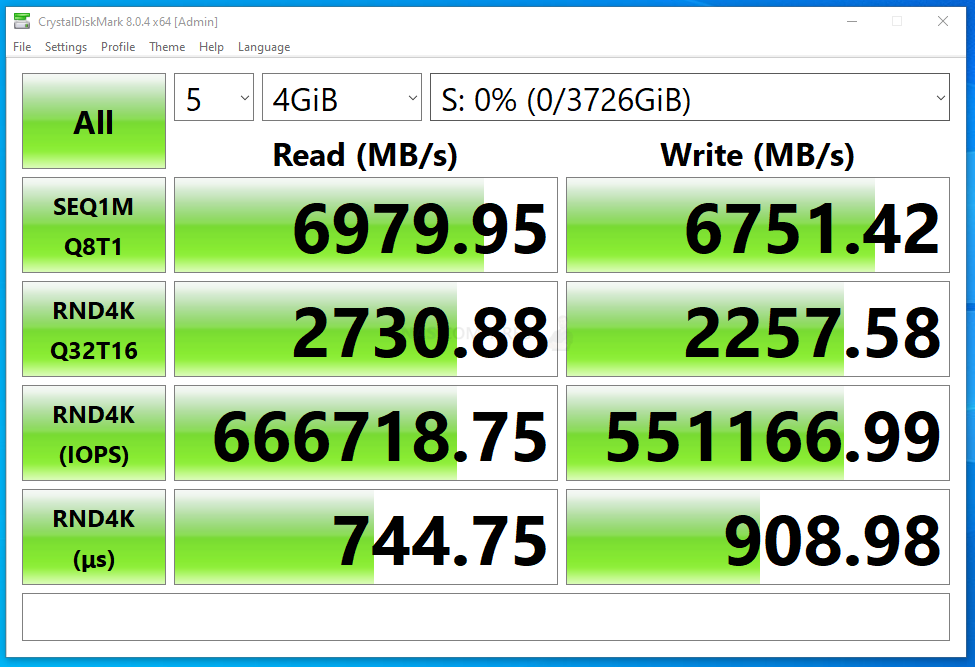 |
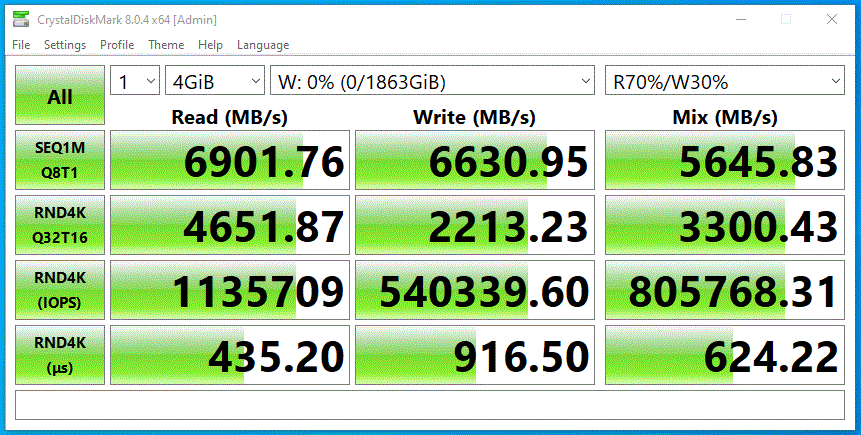 |
| Sabrent Rocket 4 Plus AS SSD 5GB IOPS | WD Black SN850X AS SSD 5GB IOPS |
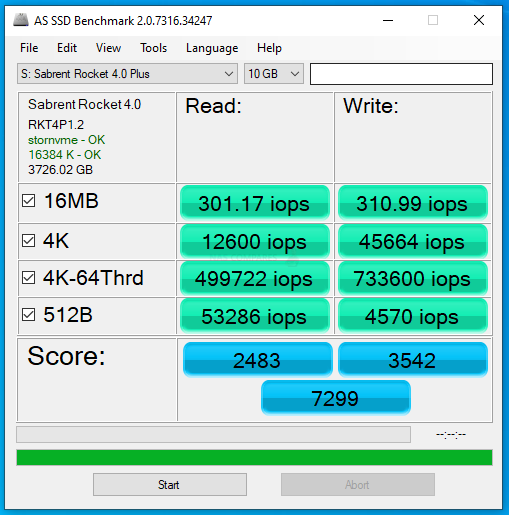 |
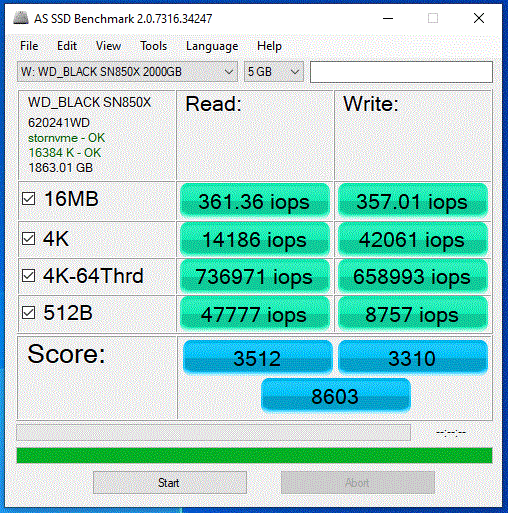 |
In terms of Read performance in transfer rates and IOPS, we can still draw accurate comparisons between these drives, even in this more domestic class test machine. In all tests, the WD Black SN850X reported much higher IOPS as predicted, but the Sabrent Rocket 4 Plus was able to achieve a pinch higher in Sequential read and write across all the tests. I will also highlight that I tested both a 2TB and 4TB of either drive and in both cases, these results played out largely the same
Sabrent Rocket 4 Plus = Better Sequential Read and Write Performance
WD Black SN850X SSD = Better IOPS Scores
WD Black SN850X vs Sabrent Rocket 4 Plus – Endurance & Durability
Unlike the other points in this comparison of the Sabrent Rocket 4 Plus and WD Black SN850X, the Endurance and Durability of an SSD is an area that is overlooked often enough that I wanted to take a moment to focus a little more on this – you can thank you years from now! The importance of SSD durability and endurance in 2022/2023 is actually pretty massive. Now that the devices we use all feature incredibly powerful processors, often cloud/network hybrid AI processes and graphical handling that will be instantly bottlenecked by traditional hard drives, SSDs are no longer just the ‘boot’ drive for our OS and are now the day to day working drive. This combined with SSD being used as caching and larger SSD capacities allowing suitable substitution for HDDs entirely means that the CONSTANT concern about SSDs lifespan and the durability of those NAND cells is now quite paramount. SSDs wear out – it’s as simple as that. The more you write, the more wear those individual NAND cells suffer – degrading performance over the years and inevitably leading to drive failure. Likewise, the smaller the drive, the greater likelihood that you will be writing, then rewriting, then rewriting, time and time again. The Sabrent Rocket 4 Plus and WD Black SN850X are no exception and alongside massive research and development in better controllers and interfaces to improve performance, the way NAND is improved has led to SSDs lasting lover than ever before. However, SSDs and NAND are not built equally and there is actually quite a large difference in durability between the WD Black SN850X and the Sabrent Rocket 4 Plus. The Storage industry typically measures the predicted durability and endurance of an SSD as TBW, DWPD and MTBF. They are:
TBW = Terabytes Written, rated as the total number of terabytes that this SSD can have written to it in its warranty covered lifespan. So if the TBW was 300TB and the warranty is 5 years of coverage, that would mean that the drive can receive on average (with deleting/overwriting data each repeatedly) 60 Terabytes per year (or 5TB a month). After this point, the manufacturer highlights that durability, endurance and performance will decline. Often highlighted as an alternative to warranty length when gauging the predicted lifespan of a SSD.
DWPD = Drive Writes Per Day / Data Writes Per Day, this is a decimalized figure that represents what proportion of the capacity of an SSD (where 1.0 = 100% capacity) can be filled, erased and/or rewritten on a daily basis. This is provided using the warranty period and TBW figure. So, for example, if a 500GB drive has a 0.3DWPD rating, that is approx 150GB of data per day
MTBF = Mean Time Between Failure, which is the interval between one failure of an SSD and the next. MTBF is expressed in hours and most industrial SSDs are rated in the Millions of Hours. MTBF and MTTF (Mean Time to Failure) have largely become overlooked in recent years in favour of TBW and DWPD in SSDs, but are still stated on most Data Sheets.
So, now you know what those large Terbyte stats, hours and decimal point details are on the average SSD datasheet. So where do the Sabrent Rocket 4 Plus and WD Black SN850X stand on this:
| Brand/Series | Sabrent Rocket Plus
|
WD Black SN850X
|
| 500GB Model | N/A | N/A |
| Total Terabytes Written (TBW) | N/A | N/A |
| Mean Time Between Failures (MTBF, hours) | N/A | N/A |
| DWPD | N/A | N/A |
| 1TB Model | SB-RKT4P-1TB | WDS100T2X0E |
| Total Terabytes Written (TBW) | 700TB | 600TB |
| Mean Time Between Failures (MTBF, hours) | 1600000 | 1,750,000 |
| DWPD | 0.4DWPD | 0.3DWPD |
| 2TB Model | SB-RKT4P-2TB | WDS200T2X0E |
| Total Terabytes Written (TBW) | 1400TB | 1200TB |
| Mean Time Between Failures (MTBF, hours) | 1600000 | 1,750,000 |
| DWPD | 0.4DWPD | 0.3DWPD |
| 4TB Model | SB-RKT4P-4TB | WDS400T2X0E |
| Total Terabytes Written (TBW) | 3000TB | 2400TB |
| Mean Time Between Failures (MTBF, hours) | 1600000 | 1,750,000 |
| DWPD | 0.4DWPD | 0.3DWPD |
| 8TB Model | SB-RKT4P-8TB | N/A |
| Total Terabytes Written (TBW) | 6000TB | N/A |
| Mean Time Between Failures (MTBF, hours) | 1600000 | N/A |
| DWPD | 0.4DWPD | N/A |
On balance, the Sabrent Rocket 4 Plus was able to pull a small victory over the WD Black SN850X SSD. That higher quality NAND and higher quantity NAND distribution of modules on the PCB (and perhaps the running temperature too, but that is unconfirmed) with everything running for longer on the Sabrent drive by a small margin. It is with highlighting that the MTBF rating of the WD Black SN850X WAS higher, but MTBF is limited in it’s application/suitability of measuring outside of a data-center and/or environments that entail high frequency off rewrites. Also, the fact that the Sabrent maintains that TBW/DWPD at even the 8TB on a 2280 PCB is certainly impressive!
Sabrent Rocket 4 Plus = Higher Durability Overall
WD Black SN850X vs Sabrent Rocket 4 Plus – Conclusion
There is a good reason why the original WD Black SN850 and Sabrent Rocket 4 Plus still continue to be amoung the most popular PCIe4 M.2 SSDs in the market – they are both such outstanding drives! So now that the Sabrnet Rocket 4 Plus has upgraded it’s NAND to 176L (as well as the O2 firmware ‘G’ version of the drive that facilitates Microsoft DirectStorage) and WD has released an upgraded drive in the WD Black SN850X, comparing them was never going to be easy. The WD Black SN850X is the better drive for mixed-use, game streamers and post-production, thanks to it’s higher IOPS rating and excellent sustained performance ratings (though keep an eye on the heat in laptop usage). The Sabrent Rocket 4 Plus is the better choice for professional esports gamers (particularly the G version), PS5 and use in large-scale databases, where an element of 24×7 use and high data recycle rates come into play. Both are excellent drives and deserve their places at the top of the food chain of consumer SSDs in 2022 and whichever one you choose, either drive is absolutely top-tier!
🔒 Join Inner Circle
Get an alert every time something gets added to this specific article!
This description contains links to Amazon. These links will take you to some of the products mentioned in today's content. As an Amazon Associate, I earn from qualifying purchases. Visit the NASCompares Deal Finder to find the best place to buy this device in your region, based on Service, Support and Reputation - Just Search for your NAS Drive in the Box Below
Need Advice on Data Storage from an Expert?
Finally, for free advice about your setup, just leave a message in the comments below here at NASCompares.com and we will get back to you. Need Help?
Where possible (and where appropriate) please provide as much information about your requirements, as then I can arrange the best answer and solution to your needs. Do not worry about your e-mail address being required, it will NOT be used in a mailing list and will NOT be used in any way other than to respond to your enquiry.
Need Help?
Where possible (and where appropriate) please provide as much information about your requirements, as then I can arrange the best answer and solution to your needs. Do not worry about your e-mail address being required, it will NOT be used in a mailing list and will NOT be used in any way other than to respond to your enquiry.

|
 |
Is It OK to Buy a Used NAS? (RAID Room)
Do You NEED 5GbE NAS? (Or Should You Skip Ahead to 10GbE)
UGREEN DXP4800 PRO NAS Review
Minisforum G7 Pro Review
CAN YOU TRUST UNIFI REVIEWS? Let's Discuss Reviewing UniFi...
WHERE IS SYNOLOGY DSM 8? and DO YOU CARE? (RAID Room)
Access content via Patreon or KO-FI
Discover more from NAS Compares
Subscribe to get the latest posts sent to your email.


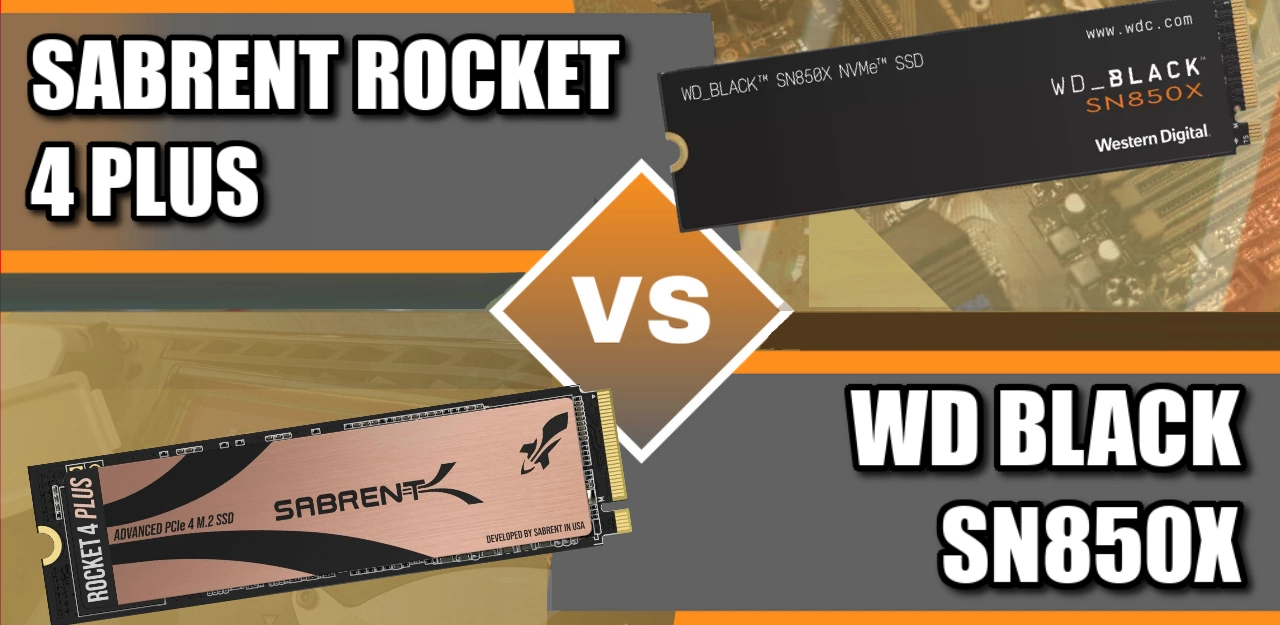







holy yappppppppppppppppppp
REPLY ON YOUTUBE
“I installed that other drive last night, my SABRENT 1TB Rocket 4 Plus NVMe 4.0 Gen4 PCIe M.2, before I went to bed. I downloaded my games and just tested Dragon’s Dogma 2 and RDR2 because they were stuttering really badly every five seconds. Now it’s not doing that, so I don’t know why that nice drive, my 2TB WD Black SN850X M.2 Gen 4 that I bought for this is doing that. That 2TB drive was going to be nice to have, but I guess it just doesn’t work very well for some reason. It’s really frustrating.” Finding an issue in a $100 drive works better than a $200 drive and they’re both generation 4 drives, and the 2TB drive has DRAM on it that should help it run better … at a loss.
REPLY ON YOUTUBE
think its a good solution for photo / video 4k editing etc for a wedding creator? i want 8tb!
REPLY ON YOUTUBE
why nobody gives the actual copy/paste speed of SSDs because these give actual 1GBps to 2GBps.?
REPLY ON YOUTUBE
A really good & detailed video ????
REPLY ON YOUTUBE
Broooo i just bought the WD BLACK SN850X but the 8TB because of black friday! i didnt know it had iops and also i wasnt expecting for the year launch to be from 2024. I just did a research right now but i always end up doing research after i purchase to test it out but i knew sabrent rocket 4 was one of my wish lists but omg i got this ssd around 500 dollars it was half price cause of black friday! so i am glad i made a perfect purchase! i believe is one of the fastest ssds in the market right now and also its a new version with the latest technology for 2024! I am so happy i purchased it! and also thanks so much for this video!
By the way one. question! Will the sabrent rocket 4 will work fast as if it was installed with heat sink in the pc or whatever if i use THUNDERBOLT 4 CABLE with a dock for it? like ENCLOSURE i mean. Or there is no such speed with an Enclosure with Thunderbolt 4? i mean if i am buying something expensive about 4tb for internal storage i am hoping there might be someone out there that created the Enclosure with thunderbolt 4 reader or ports in it.
Maybe i demand too much. But technology is going by fast now!
Thanks so much for your review and taking your time to talk about the differences and as well the testing of them.
????????????
REPLY ON YOUTUBE
Why people usually show load times only aren’t and weren’t doing this? These comparisons are right; it easily shows to me that M.2 reduces stutter and loads textures faster,ps5 is using a slower speed
REPLY ON YOUTUBE
I have to agree with this except I would add that these M.2 SN850X likes to operate in a temperature envelope of 0c to 70c or 32F to 158F
At least according to the spec sheet.
The M.2 SN850X also records every evil thing you do and reports it to your mom even when you perform an unsafe shut down and shall punish you for it.
I suggest idle temp of 35c to 45c and not a drop over 120F
REPLY ON YOUTUBE
This drive sucks. Every single game crashes
The game mode is so stupid I can’t even believe it if game mode is off game stutter if game mode is on games crash
Rtx4090 i9 14900ks
Rog Maximus Apex motherboard
I have a 980 pro Samsung and every time I suffer from crashing problems on the WD black
I transferred the game over to the 980 and it works and doesn’t crash
I’m sending the stupid drive back to Newegg
Piece of garbage do not buy
Tried tested and true okay maybe I have a faulty drive
But my Samsung drive wasn’t faulty I’m had it with this stupid WD black 8 50x garbage
REPLY ON YOUTUBE
Great content! ????
REPLY ON YOUTUBE
37mins ???? for single ssd
REPLY ON YOUTUBE
BLAH BLAH BLAH, Just rell us if its good for the PS5
REPLY ON YOUTUBE
Pity that WDC dropped backward compatibility (nvme 3, 2 and 1) clearly included in the nvme 4 specification.
REPLY ON YOUTUBE
i have ben saving for a pc good gaming pc for the past 6 years now and yea the wd black sn850x 4TB ssd is something i will have as my C drive. whenni first found out about the drive it was a bit too expensive but now the prices has dropped to acceptable levels which is a relief as my budget is at around 4k$ which means yes i will have a RTX 4k series GPU but also get the benefits of high read and write speeds with that ssd. which is required as not only do i do a lot of modded gaming.. but i also do 3d modeling in blender and coding and such things and yea that ssd together with a RTX 4080 16GB will be a huge upgrade from the 10+ year old setup i currently am working with. not to mention that the new pc will have a much better cpu (a Ryzen 9 7950x 4.5 GHz 81 MB so even better then the one used in the benchmark testing of that ssd) then my current one.. as my current one do not have AVX support.. which has become a big problems when i wanna play games like subnautica BZ and slime rancher 2 as now game devs assume that all computers that ppl are using has that as standard.. but nope.. my current pc do not.. nor do my current motherboard support a newer cpu either due to how old everything is.. so yea i am looking forward to finally getting a new modern gaming pc
REPLY ON YOUTUBE
Thanks for your complete review ????????
REPLY ON YOUTUBE
Is this compatible with Synology 1821+ ?
REPLY ON YOUTUBE
Regarding WD Black SN850X vs. Crucial P5 Plus, I’m a little confused regarding the random read speeds.
In the 1st random read test, the SN850X is 3 times faster than the P5 Plus.
In the 2nd random read test, the SN850X is 3 times slower than the P5 Plus.
So which one is more likely to be faster overall?
REPLY ON YOUTUBE
Why would they not offer the 4tb version with a heatsink? Seems odd to me, and seems like the 4tb would get hotter.
REPLY ON YOUTUBE
Thank you for being extremely thorough, mate. You get a sub ????
REPLY ON YOUTUBE
Nice shirt
REPLY ON YOUTUBE
how is your test for rand4k is so high all other tests I’ve seen are around 75
REPLY ON YOUTUBE
Good quality video with some in-depth history
REPLY ON YOUTUBE
Benchmark starts at 23:23, you’re welcome
REPLY ON YOUTUBE
Dude, is that a Casio calculator watch?
REPLY ON YOUTUBE
Can you please do a review on the Kingston KC3000? This SSD appears to be in the same class as the Sabrent Rocket 4 Plus, Firecuda 530 and the WD SN850X. Thanks for the great reviews you do, thoroughly enjoying them!
REPLY ON YOUTUBE
mine doesnt even read wtf it doesnt show up in partition either its like it doesnt exist
REPLY ON YOUTUBE
Hello can you tell me how you install bashboard for gaming mode
REPLY ON YOUTUBE
thanks for the view
REPLY ON YOUTUBE
Thanks for the review, just bought it at good Price in 2 To at 119€ ????
REPLY ON YOUTUBE
I have the 4TB version and can only get 3475 MB/s on CrystalDiskMark. I have a Dell Latitude 5591 laptop with an Intel(R) Core(TM) i7-8850H CPU @ 2.60GHz, 2592 Mhz, 6 Core(s), 12 Logical Processor(s), and 32 GB of RAM. Is something wrong, or is this a reasonable speed?
REPLY ON YOUTUBE
Was using a WD SN770 and just replaced it with the 850X 4TB. Very pleased. It hits all the marks.
REPLY ON YOUTUBE
Hi! I have a quick question: would this WD Black SN850X with the heatsink fit in my laptop Predator Helios 300 (2022 version) or should I buy the model without heatsink? Your reviews are always so helpful, thanks! 🙂
REPLY ON YOUTUBE
for ps5 does it change from a nvme 1.3 or 1.4 like this sn850x?
REPLY ON YOUTUBE
Fantastic video
REPLY ON YOUTUBE
prices have dropped 16/03/2023 today on amazon its £87 for 1tb.
REPLY ON YOUTUBE
audio is out of sync
REPLY ON YOUTUBE
Good review thank you Heat likely killed mine..had a heat sink. Installed as a drive to house simple data for VST libraries used in audio software. Installed retail box version on Nov 28, 2022. Dead March 6, 2023. BIOS no longer sees any drive in the allocated M. 2 slot on a Z390 Gigabyte MOBO. Original Intel 2TB M2 and Samsung Ssd SATA from Dec 2019 still there no issues. This is shameful. Some Amazon users rated this drive as 1 star listing failure after failure. In IT for 30 years, this is a first in this short of timeframe. Avoid.
REPLY ON YOUTUBE
So that the comparison is apples to apples, please do a benchmark test and compare Sabrent Rocket 4 Plus-G vs WD SN850X
REPLY ON YOUTUBE
Dude, get to the point.
REPLY ON YOUTUBE
teef
REPLY ON YOUTUBE
WD Black SN850X is shit i have the 4tb and it keeps crashing windows and I only get 2gb a second write to it.
REPLY ON YOUTUBE
Can someone explain something to me quick. I was looking at the heatsink that was recommended the Sabrent, but it looks like the page says it’s only for when you add an expansion ssd, not that it will work on the ps5 original ssd. So which is it?
I don’t know if I am buying an expansion ssd yet, but I also want to make sure the original ssd isn’t overheating.
REPLY ON YOUTUBE
I use this drive on my production desktop. The difference between this drive and the stock SK Hynix that was in it, is night and day. Very pleased with it.
REPLY ON YOUTUBE
Stuck it into a PCIe 3.0 with half the max speed, and still faster than high quality fastest PCIe 3.0 drive with similar max speeds. Due to bigger faster DRAM on WD drive, random read writes are faster.
Always buy WD, quality and reliability not found in any other. Not Samsung, not Kingston, not Seagate.
REPLY ON YOUTUBE
Hey Nas!
I just bought this m2 but i am unable to install windows.
I installed the harddrive, and using the windows on my SSD it’s possible to see it in diskmanagement and as storage in “computer”
However, i am unable to see it in my windows installation (USB bootable)
I have tried just about everything and i searched google thin without hope, even asked on a forum but no luck..
Please be my saviour <3
REPLY ON YOUTUBE
d ram buffer?
REPLY ON YOUTUBE
Ive Just got this ssd for christmas and have now bought an orico M.2 ssd enclosure with nvme m.2 ssd compatibility, however im unable to initialise the drive and it only appears in disk manager as one that cant be initialised and it appears in device manager but other than that it doesnt work even though its brand new adn it working on some pc’s ive tried but not my own. The conclusion ive come to is either theres something wrong with the drive or my pc having had its operating system upgraded to windows 11 rather than a full clean install and so is having issues detecting it properly, Ive made sure the BIOS is updated and any outstanding updates for my os is installed as windows has a tendancy to disable certain functionality based on if youve updated it or not but low and behold it doesnt work still does anyone know how to fix it?
REPLY ON YOUTUBE
Just picked this drive up, installed it in a new build with: i9-13900k slightly OC, 32GB DDR5-6000 and a 3090 OC. I didn’t think I would see much of a difference between my old off brand M.2 and my new SN850x but I’m here to say it was well worth the $199 I picked it up for. Pcie gen 5 is on the horizon so there are some great deals out there for the top drives. 100% would recommend.
REPLY ON YOUTUBE
4tb is almost the same price as a PS5. Not desirable for me.
REPLY ON YOUTUBE
Thank you!
Can you please expand on why you don’t feel this is a great drive for PS5 application?
4TB currently $450. Every Amazon review is CONSISTENTLY showing PS5 read speeds of just over 6,500 MB/s; highest I’ve seen registered for PS5 application (i.e., Firecuda PS5 read speeds ranging 5,200 – 6,500 MB/s)
REPLY ON YOUTUBE
Mate you are the best f**k off the rest ???? when it comes buying any SSD etc, you are my address to check. Unbiased, professional reviews
REPLY ON YOUTUBE
Just picked up one of these in 1TB for $110 on Amazon, pretty excited to feed my PS5’s thirst for disk space
REPLY ON YOUTUBE
Great vid, thanks!
REPLY ON YOUTUBE
Great content
REPLY ON YOUTUBE
Which one would be more power efficient?
REPLY ON YOUTUBE
@NASCopares May you or anyone else could please tell me if you have seen SN850X 4TB in your hand that, is 4TB single sided or it is double sided SSD? I am seeing conflicting comments, some says it is single sided and some saying it is double sided! Even in official data sheet they have mentioned exactly same thickness of SN850X regardless the capacity, that means according to data sheet 1TB and 4TB has same thickness, my laptop cannot accept double sided NVMe that’s why I want to be sure if 4TB is one sided (I know 1 or 2TB are one sided)
REPLY ON YOUTUBE
It is a legit drive for gaming. Replaced the drive in my Beelink Ser5 and huge speed difference. I play on a 50 inch Vizio 4k TV that has AMD Freesync.
REPLY ON YOUTUBE
Chill on the meth bro.
REPLY ON YOUTUBE
Juts picked up one on the Black Friday sales for GBP 87.00 for the 1TB version….A steal..
REPLY ON YOUTUBE
What a difference 2 or 3 months make. In the video the WD Black 1TB SN850X w/o heatsink is selling at $159.99. I just picked up, in a Black Friday special, the 2TB SN850X for $154.99.
REPLY ON YOUTUBE
The 4TB version is sold only without a heatsink for a reason: the chips on top are very different in height, so you have to use relatively thick thermal pads to make the heatsink sit properly flat on top. To make it worse: on the bottom, chips are on one half only, which makes it even harder to fit double-sided heatsinks easily, because you can’t use even pressure to make the top side a snug fit.
REPLY ON YOUTUBE
This one or Samsung 980 Pro w/ heatsink?
REPLY ON YOUTUBE
Need real world program/game installation times and loading, especially with the game mode.
REPLY ON YOUTUBE
how about: WD Black SN850X vs TEAMGROUP T-Force CARDEA A440 Pro vs Crucial P3 Plus, both 4TB for content creators (and also graphic designer)? Which would you choose or bang for the buck or value for money? Thanks!
REPLY ON YOUTUBE
Picked this up for blackfriday from WD’s website for 180.99 euro pretty damn cheap for such a good drive seeing also how the listing price was 260
REPLY ON YOUTUBE
good in debt video, thx..
a bit of a shame that your system isnt powerfull so it can give the true maximum performance ..
– that is a thing Id like to see, since I do have a 5950X, with a SN750 1TB + SN850 1TB, – and Iam considering upgrading the SN750 to a SN850X 2TB..
REPLY ON YOUTUBE
My laptop has pcie 3.0 still buying this one 2TB because its cheaper than 970 evo plus 2TB option lol.
REPLY ON YOUTUBE
Thanks mate ????
REPLY ON YOUTUBE
Excellent review!
REPLY ON YOUTUBE
I’ve read that many Sabrent Rocket 4 Plus die within few months, not very reliable it seems
REPLY ON YOUTUBE
Hi would this ssd work in a ps5 with a sabrent heatsink on it?
REPLY ON YOUTUBE
Petabyte….well yeah talk every day about it how far im away from it.
REPLY ON YOUTUBE
Debating this and a sn770 for my sons gaming computer running 5700xt and a ryzen 5600x
REPLY ON YOUTUBE
u got a vid like this for the samsung 980 pro?
REPLY ON YOUTUBE
Manic mutch…with french arm and ahand waving 🙂 but the info comming out in the hurrycane is nice to hear….
REPLY ON YOUTUBE
so I just brought the sn850x 4tb, knowing the nvme is both sided for the chip, which heatsink do I use. sabrent or elecgear ps5
REPLY ON YOUTUBE
How is the WD BLACK SN850X 2TB Internal SSD PCIe Gen 4 x4 with heatsink on the ps5 ?
is it very good or ok or bad or doe’s it have issue’s ( like heat or any other issue’s ) ?
REPLY ON YOUTUBE
Get to the point please
REPLY ON YOUTUBE
Just picked up one of these on Amazon for $109 US. Looking forward to tomorrow.
REPLY ON YOUTUBE
Feeling quite happy with myself I just negotiated a 2tb version for £200 on ebay only worry is I don’t think the warranty will be valid as its brought through ebay eeek
REPLY ON YOUTUBE
Can you please test the SK Hynix P41 Platinum NVMe SSD . You do an amazing job with your tests and reviews. Keep up the good work. Thanks.
REPLY ON YOUTUBE
Voice is not in sync with the mouth.
REPLY ON YOUTUBE
Just got this running in my system today and got almost 7400mb/s read speeds. I’m using a 5950x with 32Gb of 3600mb/s RAM.
REPLY ON YOUTUBE
I’m not a fan of sabrent, but I do enjoy your videos.
REPLY ON YOUTUBE
No acces time test, no Temp test, AJA test or copy speedtest.. nothing, alwais you speaking. It’s boring this channel.
REPLY ON YOUTUBE
I hate to say it but WD made me a Samsung customer for life. I used to think that WD was an excellent brand at a fractionally lower price. Then I bought a 2TB WD SSD Blue. On a heavy load this drive chokes. It completely halts the write operation for 10 or 15 seconds then it resumes for awhile, then it halts again. This pattern repeats until the write finishes. I’ve never had a Samsung do that and for $10 more, I think I’ll go for the Samsung every time from now on.
REPLY ON YOUTUBE
I’d still like to see a video on ps5 wd black speeds before and after the wd s firmware update.
REPLY ON YOUTUBE
Please do a comparison between the SN850 and the SN850X in the PS5 with video of gameplay side by side.
REPLY ON YOUTUBE
Imagine in the future people are just gonna casually have a Yottabyte on their phone ????
REPLY ON YOUTUBE
Does it need a heat sink?
REPLY ON YOUTUBE
i want to order a 2tb. I have hard time to decided between Kingston KC3000 and this WD SN850X. Today i see they are the exact same price . Both 5 years warranty and similar performance. KC3000 has more TBW at 1.6PBW and 1.2PBW for the SN850X. 36% price drop on SN850X today
REPLY ON YOUTUBE
is this ssd too hot for a laptop?
REPLY ON YOUTUBE
WD’s dashboard app is absolute dogshit. Never use it except for updates or maintenance, other than that uninstall it when you don’t need it. It absolutely destroys your pc’s performance. It maxes out your cpu usage no matter your settings or how good your cpu is. I contacted their customer support and they installed the app on their pc and were shocked at how much it destroyed their cpu usage also. They even had another rep that had a way more powerful pc try it too and same thing. They had no idea what to do about it. Such a weird pathetic issue. Even if you turned off the background process settings for it and didn’t have the program open there was still processes it was doing destroying your usage. You had to uninstall it completely to get your perf back. It’s been a year now so I’m hoping they maybe fixed it? Idk the whole thing seemed so negligent, careless, and ignorant.
REPLY ON YOUTUBE
Hi, thanks for the informative videos. Have you checked if the 850x comes with the latest firmware since it impacts performance when using enclosures like orico? I have the 4TB version, I tried to check firmware on pc using dashboard but couldn’t get the software to install properly, blank window, I’ll contact WD for that. I got 2450/2700 with the shipped firmware, on mac mini thunderbolt 3, APFS format. Thanks
REPLY ON YOUTUBE
Love your videos and the comparison one’s. Test it on ps5 vs the 850 regular.
REPLY ON YOUTUBE
When Pcie 5.0 drives launch, will you test one in the PS5 ?
Thanks Nas.
REPLY ON YOUTUBE
Nvme slot are left handed. Not right handed.
REPLY ON YOUTUBE
Looking at the fingers, not even it has hit the magical 7000 finger
I am positive cpu and ram and motherboard have influence in final speeds ,
???? even my gigabyte nvme has better stats than your wd .
REPLY ON YOUTUBE
Can you please offer the ssd to mee? I need it so much for my ps5 😀
Thank you in advance 🙂
REPLY ON YOUTUBE
WD Black SN850X (2022) over the SN850 we’ll only see an improvement in write output, but otherwise it’s the same. So whatever is at a better price is worth it.
Firmware – WD Black SN850 – 1TB
611100WD – 01.2021
612100WD – 03.2021
613200WD – 07.2021
614300WD – 09.2021
614600WD – 11.2021
614900WD – 02.2022
Firmware – WD Black SN850X – 1TB
620241WD – 06.2022
REPLY ON YOUTUBE
Re: specs on the flash modules – I’ve been researching drives for a new build for multiple hours now. I’m in the US, where KIOXIA doesn’t sell their consumer grade stuff, but after looking into it, I’m like 90% sure that this is, essentially, almost a rebrand of the KIOXIA exceria pro. The specs are almost identical, and WD’s flash is made by Toshiba’s (kioxia’s) chip fab. In the rest of the civilized world, you can just buy the kioxia drive if you want the speed, but I think in the US, for … marketing reasons (?), you are expected to settle on the WD Black.
REPLY ON YOUTUBE
I love these videos, they’re just so damned entertaining
REPLY ON YOUTUBE
Great video, i also saw some odd heatsinks on Amazon, the new ineo heatsink w/cover, Graugear heatsink w/cover too, they look…well you’d need to see them, temp test with one of those and this ssd would be something on the Ps5.
REPLY ON YOUTUBE
Still be nice in my PS5. I only just got a 2Tb 850 on prime day, but I’ll be looking at the 850X in November. I can offload my 850 to the mrs, mates rates so be both win.
REPLY ON YOUTUBE
You should check out EKWB’s new Quantum Convection M.2 NVMe heat sinks. They’re the company who made the heat sink for the seagate firecuda 530
REPLY ON YOUTUBE
3:45 Sabrent was actually the very first to bring a PCIe 4.0 drive to the market.
REPLY ON YOUTUBE
what is faster?
REPLY ON YOUTUBE
Subscribed this is the best and only YouTube channel that you need to watch in terms of drives.
REPLY ON YOUTUBE
Please do a video with 850x inside the ps5. Thanks!
REPLY ON YOUTUBE
Will u test it on PS5? Would love to see the results
REPLY ON YOUTUBE
I know you said in this video that there’s probably little difference between 850 & 850x in the ps5, but I would like a video with 850x in the ps5.
REPLY ON YOUTUBE
I have always wondered why is the 4TB the same speed as the 2TB, but the 2TB is faster than the 1TB? The 4TB has more DRAM package on the back so you would think it would also increase speed.
REPLY ON YOUTUBE
Been looking for a review of this drive, NASCompares delivered on time as usual !
REPLY ON YOUTUBE
How does the 850x compare to the Firecuda 530?
REPLY ON YOUTUBE
7:31 Should you remove the sticker on the m.2 ssd? asking cause mine is on with a heatsink on it. >_>
REPLY ON YOUTUBE
i personally have never found appealing the value of WD’s ssds. always 10-15% pricier where i live than samsung/crucial/kingston counterparts.
i like the hdds though
REPLY ON YOUTUBE
Hello; thank you for your vidéo and thank you for all of them. What you do is very interesting to compare and chooose the ssd we want for your bugdet.
And your vidéos about the heat on SSD are very interesting for learning.
Have a good week and see you soon.
REPLY ON YOUTUBE
Hi I’ve purchased a rocket nvme 4.0 m.2 ssd for my PlayStation 5 will this work ok
REPLY ON YOUTUBE
Mines not working…it says can’t use the ssd in the expansion slot..already tried 3x.. i’m using the sabrent rocket 4plus 2tb m.2 pcle gen4 nvme ssd…
REPLY ON YOUTUBE
If one could get the Sabrent for cheaper then the WD SN850. Would you advise to get the Sabrent over the WD?
REPLY ON YOUTUBE
i own 3 2 tb rocket those tings are awesome nad getting another for my ps5
REPLY ON YOUTUBE
UPDATED – Recommended PS5 Compatibile SSDs & Heatsinks – https://nascompares.com/2021/08/03/recommended-ps5-compatibile-ssds-heatsinks-updated/
REPLY ON YOUTUBE
tryna hook me up w that drive????? need that for my ps5????
REPLY ON YOUTUBE
So does the Sabrent SSD and heatsink fit in the PS5 expansion slot??
REPLY ON YOUTUBE
Very tempting to get an sn850 but I’ll probably get one towards the end of this month or towards the middle of september so I can return it if it doesn’t work
REPLY ON YOUTUBE
So just to Confirm NVMe does not come with any kind of Heatsink..
REPLY ON YOUTUBE
The registration is designed to harvest contact information.
REPLY ON YOUTUBE
I wrote 7 months ago on this channel to get 980 pro they told me to wait for Sony now u people see it works like I said
REPLY ON YOUTUBE
The 5 year warranty registration is all about getting your personal data.
REPLY ON YOUTUBE
I’m curious which ssd m.2 nvme have in mind to buy? my choice so far is GIGABYTE AORUS 7000s PCIe 4.0 NVM. But i’m just waiting for offiecial list
REPLY ON YOUTUBE
I’m all up for 4TB SN850, don’t care about the price. Just want full experience without ounce of patience.
Edit: I also recommend M.2 heatsink from Silverstone. It give constant 31 degrees and the temp will drop by 2 degrees after replacing stock thermal pad into Thermalright Thermal Pad 1mm. Planning to get Fujipoly Extreme Pad.
REPLY ON YOUTUBE
The SSD cooling block does fit in the PS5, just make sure the standoff is being used UNDER the SSD and not on top of the SSD
REPLY ON YOUTUBE